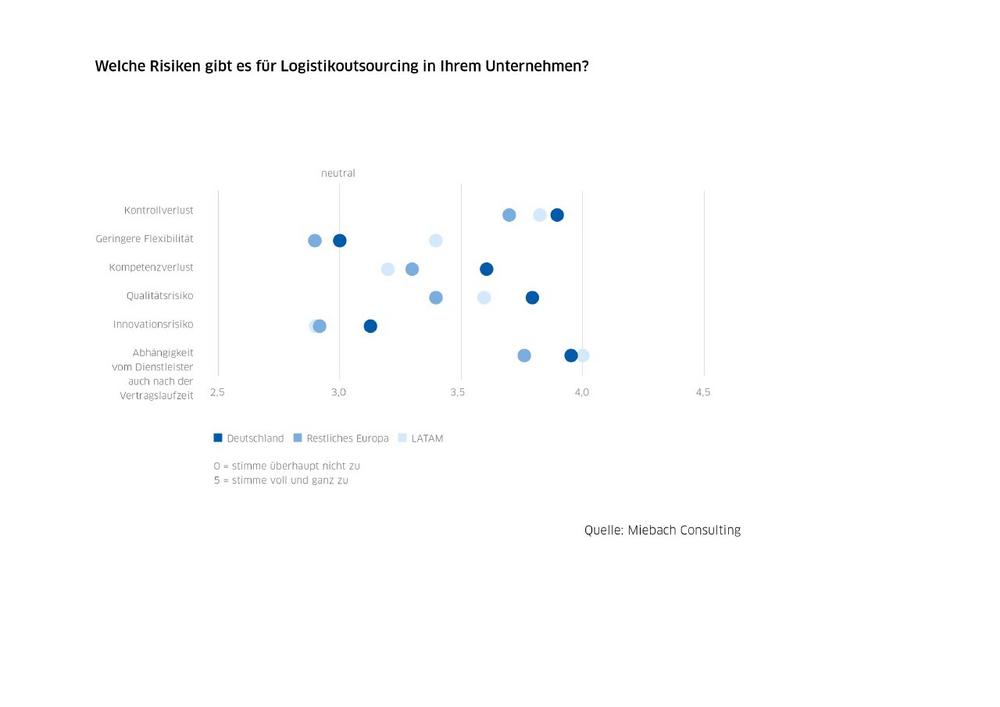
Miebach Study Logistics Outsourcing 2023: Success factors of a successful realization phase
Logistics outsourcing is undergoing change
“Shippers today evaluate logistics outsourcing differently than they did five or ten years ago, in terms of the associated goals, risks and decision criteria for service provider selection. Service providers, on the other hand, have not yet fully adapted to these new requirements. In some cases, there is a lot of catching up to do in order to get closer to customers again,” says Dr. Klaus-Peter Jung, Partner, Miebach Consulting GmbH.
German logistics service providers in particular are currently massively underestimating the importance of the newly included selection criteria such as innovation capability, personnel recruitment, compliance with the Supply Chain Due Diligence Act, tariff compliance and even “diversity culture”. This result is all the more surprising since the assessment of the importance of “traditional” criteria has been very accurate over the years and, on the other hand, the difference in the assessment between shippers and logistics service providers in Latin America and the rest of Europe is significantly lower than in Germany.
Satisfaction with outsourcing results declines
As was the case from 2017 to 2020, client satisfaction with their outsourcing outcomes has now decreased in 2023 compared to 2020. This applies equally to all regions, although it is lowest in Germany, where overall satisfaction is already lowest. This is mainly due to a significant deterioration in qualitative success factors. In Germany, for example, only 43% of respondents are satisfied with the qualitative results of outsourcing.
Qualification, continuous improvement and KPIs identified as success factors for implementation – but employee trainings decline
Employee qualification, open communication, transparency and KPIs as well as efforts to achieve continuous improvement are all success factors for the implementation of outsourcing projects.
Although companies place a high priority on employee qualifications, employee trainings are declining in outsourcing projects: after a decline in 2020, the results from 2023 again show an increase in projects without training to 14% for Germany. If no training was provided, this is usually because those responsible are convinced that training was not necessary.
“Inadequate employee training has already led to low productivity, increased errors, and damage to goods and warehouse equipment at some of the companies surveyed. The problem of declining qualifications, which has been virulent for years, has become even more acute in combination with the shortage of skilled workers, which is also very noticeable in logistics. The decline in training in outsourcing projects is therefore clearly a step in the wrong direction,” says Prof. Dr. Bernd Müller-Dauppert, member of the management board, Miebach Consulting.
Further results are available in the study report which can be requested from Ralf Hoffmann by e-mail (hoffmann@miebach.com).
Miebach Consulting offers supply chain consulting and engineering services with a strong digital expertise. Our clients range from medium-sized businesses to global companies that enhance and expand their competitive position with innovative logistics solutions. The Miebach Group, founded in 1973 in Frankfurt, today has 27 offices worldwide in Europe, Asia, and North and South America. With over 500 employees, we are one of the leading international consultants in logistics and supply chain management. As a result, you get what we stand for: Supply Chain Excellence. www.miebach.com
Miebach Consulting GmbH
Rotfeder-Ring 7-9
60327 Frankfurt am Main
Telefon: +49 (69) 273992-0
Telefax: +49 (69) 273992-20
http://www.miebach.com
Managerin PR & Marketing
Telefon: +49 (69) 273992-36
Fax: +49 (69) 273992-20
E-Mail: tillmanns@miebach.com
![]()





